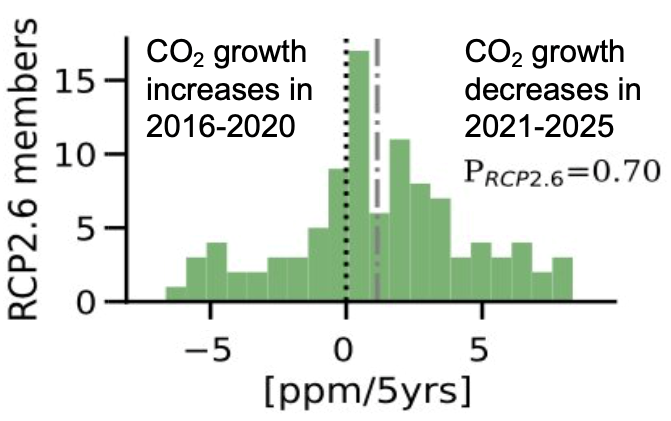CO2 emission reductions only distinctly attributable in the atmosphere after a decade
The amount of anthropogenic CO2 emissions remaining in the atmosphere varies each year because land and ocean efficiency to take up parts of those emissions depends on the current state of the climate. For example, in warm and wet years, trees grow stronger and take up more carbon from the atmosphere. Therefore, the remaining atmospheric increase is less strong than in cold or dry years. Currently, under strong and increasing CO2 emissions, this variability due to the carbon sinks is not obvious to pick up from the Keeling curve, a daily record of atmospheric carbon dioxide concentration.

Spring and his co-authors used 100 numeric simulations based on the Max Planck Institute Earth system model (MPI-ESM), started with slightly perturbed initial conditions (https://mpimet.mpg.de/en/science/projects/integrated-activities/grand-ensemble). They investigated after how many years CO2 emission reductions would cause a reduction in the present increasing trend.
They found that the atmospheric CO2 growth in the five years after CO2 emission reductions started decreases in 70 simulations and the average of all simulations compared to the five years before [see Figure 1]. That implies that in 30 simulations atmospheric CO2 increases stronger than before despite CO2 emission reductions on the basis of internal variability. Only when considering 10-year trends, a slowdown in atmospheric CO2 increase is caused by CO2 emission reductions distinctly.
These results show that policy-makers, when assessing mitigation efforts every five years, should not pay too much attention to previous multi-year trends in atmospheric CO2 observations, because these are prone to internal variability.
Original publication:
Spring, A., Ilyina, T., & Marotzke, J. (2020). Inherent Uncertainty Disguises Attribution of Reduced Atmospheric CO2 Growth to CO2 Emission Reductions for up to a Decade. Environmental Research Letters. doi: 10.1088/1748-9326/abc443
Reference paper:
Marotzke, J. (2019). Quantifying the irreducible uncertainty in near-term climate projections. Wiley Interdisciplinary Reviews - Climate Change, 10: e563. doi:10.1002/wcc.563
Contact:
Aaron Spring
Max Planck Institute for Meteorology
Email: aaron.spring@mpimet.mpg.de
Dr. Tatiana Ilyina
Max Planck Institute for Meteorology
Email: tatiana.ilyina@mpimet.mpg.de
Prof. Dr. Jochem Marotzke
Max Planck Institute for Meteorology
Phone: +49 (0)40 41173 311 (Assistant Kornelia Müller)
Email: jochem.marotzke@mpimet.mpg.de
